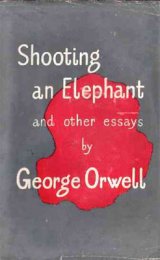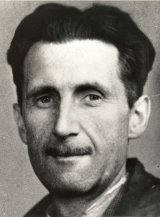Shooting an Elephant Page #3
"Shooting an Elephant" is an essay by George Orwell, first published in the literary magazine New Writing in late 1936 and broadcast by the BBC Home Service on 12 October 1948.
I got up. The Burmans were already racing past me across the mud. It was obvious that the elephant would never rise again, but he was not dead. He was breathing very rhythmically with long rattling gasps, his great mound of a side painfully rising and falling. His mouth was wide open – I could see far down into caverns of pale pink throat. I waited a long time for him to die, but his breathing did not weaken. Finally I fired my two remaining shots into the spot where I thought his heart must be. The thick blood welled out of him like red velvet, but still he did not die. His body did not even jerk when the shots hit him, the tortured breathing continued without a pause. He was dying, very slowly and in great agony, but in some world remote from me where not even a bullet could damage him further. I felt that I had got to put an end to that dreadful noise. It seemed dreadful to see the great beast Lying there, powerless to move and yet powerless to die, and not even to be able to finish him. I sent back for my small rifle and poured shot after shot into his heart and down his throat. They seemed to make no impression. The tortured gasps continued as steadily as the ticking of a clock. In the end I could not stand it any longer and went away. I heard later that it took him half an hour to die. Burmans were bringing dash and baskets even before I left, and I was told they had stripped his body almost to the bones by the afternoon. Afterwards, of course, there were endless discussions about the shooting of the elephant. The owner was furious, but he was only an Indian and could do nothing. Besides, legally I had done the right thing, for a mad elephant has to be killed, like a mad dog, if its owner fails to control it. Among the Europeans opinion was divided. The older men said I was right, the younger men said it was a damn shame to shoot an elephant for killing a coolie, because an elephant was worth more than any damn Coringhee coolie. And afterwards I was very glad that the coolie had been killed; it put me legally in the right and it gave me a sufficient pretext for shooting the elephant. I often wondered whether any of the others grasped that I had done it solely to avoid looking a fool.
Translation
Translate and read this book in other languages:
Select another language:
- - Select -
- 简体中文 (Chinese - Simplified)
- 繁體中文 (Chinese - Traditional)
- Español (Spanish)
- Esperanto (Esperanto)
- 日本語 (Japanese)
- Português (Portuguese)
- Deutsch (German)
- العربية (Arabic)
- Français (French)
- Русский (Russian)
- ಕನ್ನಡ (Kannada)
- 한국어 (Korean)
- עברית (Hebrew)
- Gaeilge (Irish)
- Українська (Ukrainian)
- اردو (Urdu)
- Magyar (Hungarian)
- मानक हिन्दी (Hindi)
- Indonesia (Indonesian)
- Italiano (Italian)
- தமிழ் (Tamil)
- Türkçe (Turkish)
- తెలుగు (Telugu)
- ภาษาไทย (Thai)
- Tiếng Việt (Vietnamese)
- Čeština (Czech)
- Polski (Polish)
- Bahasa Indonesia (Indonesian)
- Românește (Romanian)
- Nederlands (Dutch)
- Ελληνικά (Greek)
- Latinum (Latin)
- Svenska (Swedish)
- Dansk (Danish)
- Suomi (Finnish)
- فارسی (Persian)
- ייִדיש (Yiddish)
- հայերեն (Armenian)
- Norsk (Norwegian)
- English (English)
Citation
Use the citation below to add this book to your bibliography:
Style:MLAChicagoAPA
"Shooting an Elephant Books." Literature.com. STANDS4 LLC, 2025. Web. 22 Jan. 2025. <https://www.literature.com/book/shooting_an_elephant_8>.




Discuss this Shooting an Elephant book with the community:
Report Comment
We're doing our best to make sure our content is useful, accurate and safe.
If by any chance you spot an inappropriate comment while navigating through our website please use this form to let us know, and we'll take care of it shortly.
Attachment
You need to be logged in to favorite.
Log In